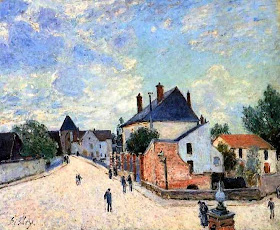Alfred Sisley, the least successful of the major artists associated with Impressionism, has been very little studied. He died in relative poverty and obscurity in 1899; his friends Claude Monet, Auguste Renoir, and Camille Pissarro had all become relatively wealthy and famous. Yet, of all the Impressionist landscape painters, Sisley was the most continuously faithful to the tenets of the movement. While Pissarro shifted style frequently and Monet, Paul Cezanne, and Renoir developed modes of painting almost totally at odds with the informally structured, suburban landscape aesthetic of the 1870s, Sisley persisted in his attempts to refine and extend that style in isolation. Unlike his colleagues who painted in England, Italy, and throughout much of France, he rarely left the root landscape of Impressionism, the Ile de France. In fact, [Street in Moret and others] were made in the ancient walled town of Moret-sur-Loing, where Sisley spent the last nineteen years of his life.
A quality of nostalgia suffuses Sisley’s late paintings, done after Impressionism had been superseded by other avant-garde movements. No modern forms invade his landscapes—there are no trains, factories, or machines. Gone, too, are the suburban strollers and boaters of the 1870s. They have been replaced by what Sisley and others must have hoped would be an enduring past, a world of ordinary small-town life without the distractions and moral ambiguities of Paris. Sisley’s art after 1886 is in every sense “late” Impressionism—impressions of a rapidly vanishing world.
Richard Brettell
from “French Impressionists”
When Alfred Sisley was a young painter
he created Impressionist landscapes
that had little touches that were his own.
He used little angles others did not.
He put his images in perspective
when his friends avoided that kind of thing.
And when his friends moved on to other things—
and when his world moved on to other things—
even as an old man he continued
to use little angles others did not.
And he continued to paint his own world,
not the new world being built around him.
I know a book that is one of a kind.
I’ve read a lot of books but I can’t name
another book that is quite like this book.
A woman painter went to the Balkans
and painted the ruins from the Balkan wars.
he created Impressionist landscapes
that had little touches that were his own.
He used little angles others did not.
He put his images in perspective
when his friends avoided that kind of thing.
And when his friends moved on to other things—
and when his world moved on to other things—
even as an old man he continued
to use little angles others did not.
And he continued to paint his own world,
not the new world being built around him.
I know a book that is one of a kind.
I’ve read a lot of books but I can’t name
another book that is quite like this book.
A woman painter went to the Balkans
and painted the ruins from the Balkan wars.
She wasn’t harassed. People rebuilding
or trying to sometimes stopped to watch her.
Photographers from magazines sometimes
took her photo while she painted pictures.
One painter working in a ruined landscape.
The phrase “Ile de France” means Island of France.
It means the area around Paris.
All the Impressionists, when they started,
created images of that landscape.
The root landscape of Impressionism.
If someone can, I think it’s good to be
continuously faithful to something.
or trying to sometimes stopped to watch her.
Photographers from magazines sometimes
took her photo while she painted pictures.
One painter working in a ruined landscape.
The phrase “Ile de France” means Island of France.
It means the area around Paris.
All the Impressionists, when they started,
created images of that landscape.
The root landscape of Impressionism.
If someone can, I think it’s good to be
continuously faithful to something.
. . . . . . . . . . . . . . . . . . . . . . . . . . . . . . . . . . . . . . . . . .
Ile-de-France
at Wikipedia
Balkan Wars
at Wikipedia
*
Trivial Things As Doubleplusungood
Beyond The Horizon From Here
That Girl – In Which I Quote The Khmer Rouge
“Sexy As The Dead Bridges”
The Prettiest Ophelia Is An Asteroid
Aberrant Forms


No comments:
Post a Comment